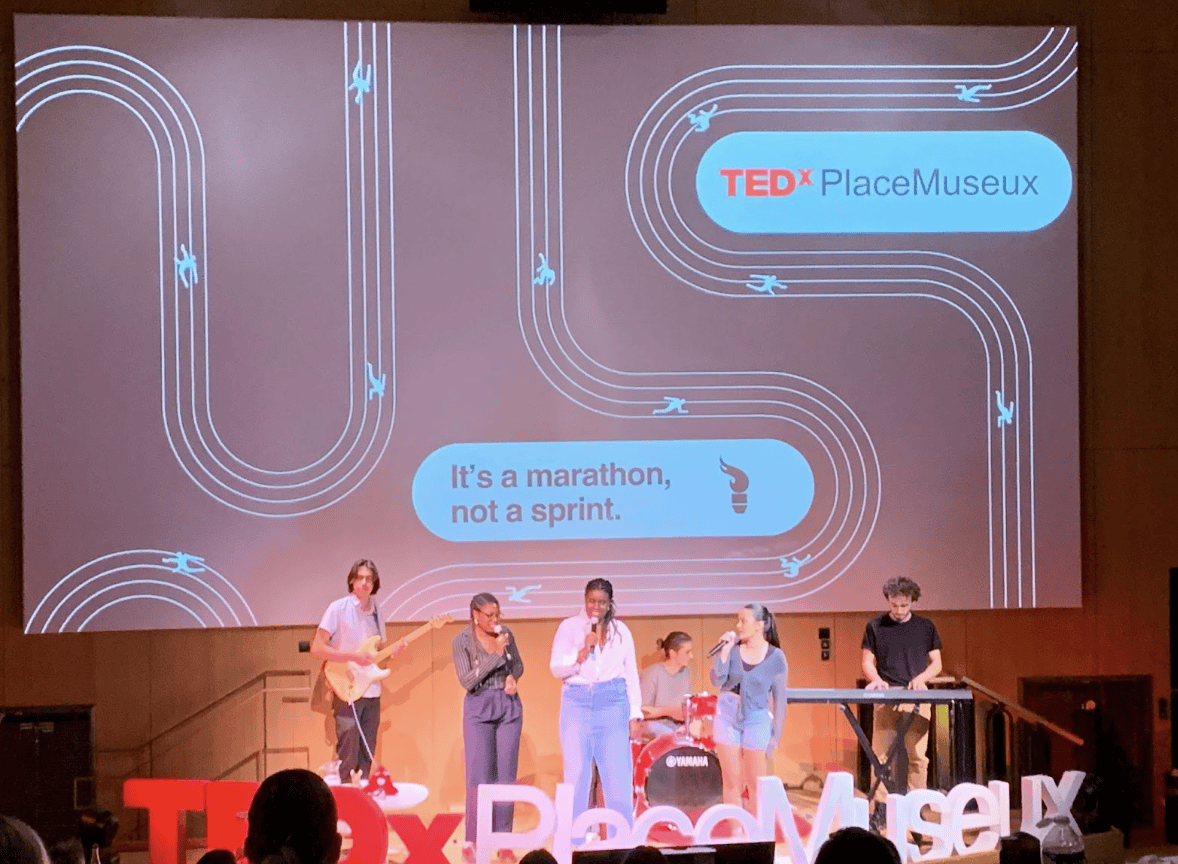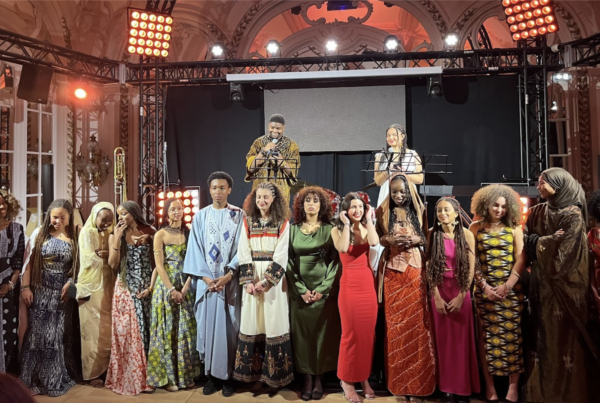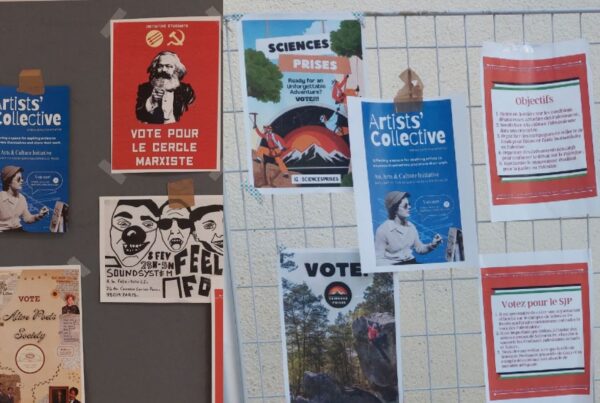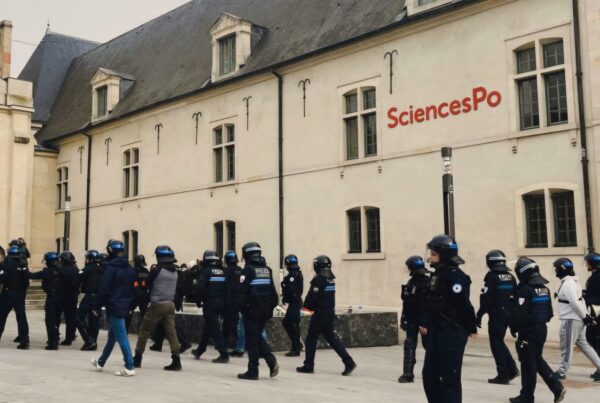Last weekend, TEDx Place Museux held its annual TEDx event, hosting a diverse line-up of experts and ambitious students from our campus. Through their theme “It’s a marathon, not a sprint,” the participants showed us that although real progress takes time, it is worth the wait. Let’s recap what happened during the event.
TEDx conferences are independently organised events under the TED licence. In the case of TEDx Place Museux, students invite a plethora of speakers while also giving the opportunity to students to take part. Last year, their theme was “Spark a revolution.” This time around, they aimed to showcase how one should look at progress – be that on the personal or the global level – as something that takes time. In other words, progress is a marathon, not a sprint.
The first speaker was Miroslac Beblavý, a former member of the Slovakian parliament, and a lecturer at Sciences Po Paris. He talked about how hype cycles are risky phenomena that may cause erroneous policy-making. Hype cycles are periods when the media starts reporting on a country, bringing special attention to it. But eventually, these bubbles burst, and the world is forced to realise how it was a mere misrepresentation of reality. This happened to all countries in the Visegrad Group (Czechia, Hungary, Poland, and Slovakia). For example, Hungary was praised for its economic progress before joining the EU, but it later turned out that it was based on the constant lies of former Prime Minister Ferenc Gyurcsány. Beblavý argues that such hype cycles are dangerous, especially in the context of EU expansion. We have to be careful with what we base our policies on because, once the bubble bursts, we realise that we had made decisions based on a false enthusiasm.
The second round of speakers were two students from our campus, Rysha and Keval. They shared their experiences of finding their own methods to manage their lives. Keval told the audience how he tried to follow his parents’ advice but ultimately found that they didn’t work for him. He also tried other alternatives but ultimately found that he needed to find what worked for him through trial and error. His co-speaker, Rysha, spoke about how her high-school methods of keeping up with her to-do list didn’t work at Sciences Po. She, too, had to try different new approaches to finally find what suited her the best. The takeaway of their speech was that one must try new things in order to find what best works for them. It is a process of creative destruction, of stepping out of your comfort zone to find new ways of adapting to our changing lives.
Alzbeta Klein from the International Fertilizer Association was the third speaker. She shared her knowledge of sustainable agriculture and the future of food production. She highlighted the incredible power of food as a vessel of energy and nutrients that sustain human populations around the globe. To achieve this, we have to ensure that our agricultural practices are sustainable and the plants themselves receive the proper nutrients that they pass onto us. She ultimately argued for the importance of the journey towards the future that will allow us to overcome the challenges we face in the context of sustainable agriculture.
After the lunch break, the event reconvened with the speech of Lana-Sydney Ferreira Fernandes, a 1A EURAF student. She is the daughter of two Olympic athletes and one of the torch bearers for the 2024 Olympic Games in Reims. She spinned the topic of the event, arguing that a marathon is a sprint. She highlighted how we valourise Olympic torch bearers for those 10 minutes of the ceremony, but we tend to overlook the immense preparation that went into their careers. She quoted Usain Bolt, saying that the competition is the easiest part, whereas the training is what truly matters.
Fifth came Raphael Pouyé, a researcher of democracy and civic engagement. He started his speech with the famous Churchill quote, “Democracy is the worst form of government except for those that have been tried from time to time.” Mr. Pouyé strongly disagrees with this idea, and rather argues that we have to adopt a democracy of the 21st century. For him, there are two important methods that ought to be implemented. Firstly, civic tech, which is the use of data science by citizens to analyse the issues of democracies. This is not necessarily to criticise governments but to enable administrations to improve policies in healthcare, education, etc., especially in emerging democracies in the Global South. Secondly, deliberative assemblies that involve inviting the public to participate in a citizens’ assembly to discuss the issues of their communities. This method, he argues, brings democracy closer to the people, and provides decision-makers with an opportunity to listen to civil society. Pouyé argues that democracy is not a failed system, it just needs some improvements.
The last speaker was Jayasurya Kalakkal, a UN consultant on matters of the environment and trade, and a Sciences Po alumnus. She began her speech with the famous example of the tragedy of the commons. She demonstrated how this metaphor of overfishing is slowly becoming a reality, as now a third of the world’s fish stocks are overexploited, putting many fish species on the verge of going extinct. Moreover, this process is often supported by governments through what are called harmful fisheries subsidies. Ms Kalakkal argues that the solution is through international negotiations that ban these kinds of subsidies, but this raises additional challenges. Negotiations at the WTO are dominated by high-HDI countries who have better resources to reach a consensus that is favourable to them. She argues that this reality brings the concept of “common but differentiated responsibilities” to the forefront of the discussion (CBDR). CBDR argues that countries share responsibility for issues such as overfishing, but this responsibility is not equal between all countries.
To end the event, Elefunk held an electric performance, staying true to its standards. Overall, this year’s TEDx Place Museux was a collage of fascinating ideas that all underscored the fact that important things take time to manifest, but ultimately, it will be worth it.
Other posts that may interest you:
- The Trouble with ‘Ecocide’
- Carbon dioxide removal – hit or miss?
- Local Victories for Turkish Opposition — A Sign of Hope?
- Are France and Japan a Mismatch Made in Heaven?
- A Reflection on Dark Tourism
Discover more from The Sundial Press
Subscribe to get the latest posts sent to your email.





